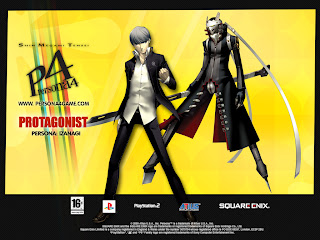Shin Megami Tensei: Persona 4, originally released in Japan as simply Persona 4 (ペルソナ4 Perusona Fō), is a role-playing video game developed and published by Atlus for Sony's PlayStation 2, and chronologically the fifth installment in the Shin Megami Tensei: Persona series. Persona 4 was released in Japan in July 2008, North America in December 2008, and Europe in March 2009. It features a weather forecast system with events happening on foggy days to replace the moon phase system implemented in the previous games.
Instead of the city locales of previous games in the series, Persona 4 takes place in a fictional Japanese countryside and is indirectly related to both Shin Megami Tensei: Persona 3 (in terms of gameplay, story and production) and the Persona 2 duology (in terms of Shadow selves and confronting them to awaken Persona). The player-named main protagonist is a high-school student who moved into the countryside from the city for a year. During his year-long stay, he becomes involved in investigating mysterious murders while harnessing the power of summoning Persona.
The release of the game in Japan was also accompanied with retail merchandise revolving around the game's theme such as character costumes and accessories. The North American package of the game was released with a CD with selected music from the game, and, unlike Persona 3, the European package also contained a soundtrack CD. The music was composed by Shōji Meguro, with vocals by Shihoko Hirata who sang the theme song "Pursuing My True Self". The game was positively received by critics, and it continues to be promoted by Atlus through releases in other media such as adaptation in manga and anime, followed by an enhanced remake, a fighting game sequel, and side stories in the forms of a manga and light novel.
Gameplay
 Like its predecessor, Persona 3, the gameplay of Persona 4 alternates between that of a traditional role-playing video game and of a simulation game. The protagonist of Persona 4 is a teenage boy, named and controlled by the player. The game takes place over the course of a traditional Japanese school year.
Outside of key events, the protagonist attends school, and can interact
with other students and characters, spend time at part-time jobs to
earn money, or engage in other activities. The player may also enter the "TV World", an alternate reality where the game's dungeon-crawling gameplay occurs. Each day in Persona 4 is broken up into different periods of time, such as After School or Evening.
Certain activities are limited to certain times of day. In addition,
the ability to engage in certain activities is based on the day of the
week, or the weather.
Like its predecessor, Persona 3, the gameplay of Persona 4 alternates between that of a traditional role-playing video game and of a simulation game. The protagonist of Persona 4 is a teenage boy, named and controlled by the player. The game takes place over the course of a traditional Japanese school year.
Outside of key events, the protagonist attends school, and can interact
with other students and characters, spend time at part-time jobs to
earn money, or engage in other activities. The player may also enter the "TV World", an alternate reality where the game's dungeon-crawling gameplay occurs. Each day in Persona 4 is broken up into different periods of time, such as After School or Evening.
Certain activities are limited to certain times of day. In addition,
the ability to engage in certain activities is based on the day of the
week, or the weather.
By spending time with people, the protagonist forms "Social Links",
which are friendships the protagonist makes as the game progresses, each
represented by one of the Major Arcana.
When a Social Link is first formed, it starts at Rank 1, increasing
over time as the protagonist spends time with that person, until it
reaches MAX Rank,which is Rank 10. Social Links grant the player bonuses
when creating new Personas in the Velvet Room.
Social Links are also influenced by the protagonist's five attributes:
Understanding, Diligence, Courage, Knowledge and Expression, which can
be improved through various activities, such as part-time jobs and
sports teams. These attributes in turn may also affect the protagonist's
interaction in daily activities outside of Social Links.
Persona 4's timeline
is driven by the disappearance of characters from the real world into
the TV World, indicated through the "Midnight Channel". The one-week
weather forecast indicates the amount of time players have to rescue
people who have disappeared, in which foggy days mark the deadline of
the rescue mission. The game ends
when the player fails to retrieve the missing person in time, and is
given the choice to return to one week before the fog appeared.
While in the TV World, the player explores randomly generated dungeons
in the field map; each dungeon is of a certain theme, based on the
victim that has been kidnapped.
Dungeons are divided into floors, each containing Shadows, enemies the
protagonist and his friends fight, and treasure chests, which contain
items or equipment.
Combat
Offensive abilities cause certain types of damage, such as "physical", "fire" or "almighty". Enemies the player encounters may have a weakness to a certain type of attack. By exploiting an enemy's weakness, it will be knocked down, and the attacker is given the opportunity to act again. If every enemy in a battle is knocked down, the player may initiate an All-out Attack, a powerful attack in which the player's party rushes the downed enemies, removing weaker enemies and inflicting heavy damage on stronger ones. At the end of the battle, players are awarded with experience and items, and may be given the chance to choose a new Persona to summon in battle.

No comments:
Post a Comment